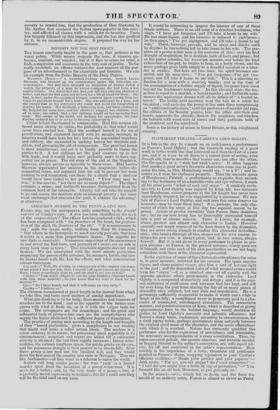ATROCIOUS MURDER BY THE PENNY-A-LINE MEN. EVERY day, say the
newspapers, adds something to the fewful interest of Corder's case. A WM has been identified on the neck of the corpus deli& ! The officer Lea has produced a dirk, which has been compared with "the puncture of the heart, the peiforalion of the skull, the fracture of the rib." " It is unnecessary to say," adds the tragic scribe, inditing from Bury St. Edmunds, " that where in the metropolis so much anxiety prevails, that here it exists in a more than proportionate degree. The appetite for new facts is insatiable. Numerous engravings of the occurrences in and about the Red-barn, and portraits of Corder, are on sale in every book shop in town." This insatiable appetite does not want feeders. We are entertained with the most minute particulars respecting the person of the prisoner, his manners, habits, and how he shakes hands with Mr. Lea the officer, and what conversation ensues thereupon.
Lea said—" Well, Mr. Corder, in consequence of the request you made of me when I last saw you, that I should call upon you on my return to Bury, I have accordingly done so, and am glad to see you so well." Corder—" I am much obliged to you for your kindness (shaking hands with him most heartily) ; do you know that my trial is fixed for tomorrow ?"
Lea—" So I have heard, and that it will come on very early." Corder—" I believe so."
The dialogue is continued at great length in the journal from which we take this, and turns upon matters of similar importance.
What gin-drinking is to the body, these murders and rumours of murders are to the mind ; and as the appetite in the former case grows with what it feeds on, so is it with the vulgar taste for crime. The newspapers are the dramshops ; and the great and influential body of penny-a-line men are the manufacturers who supply the liquor medicated to a sufficient degree of stimulation. The practice of paying men according to the length and breadth of their "horrid particulars," gives a complexion to our reading that might well make a sober nation blush. The nucleus is a crime ordinary in its nature, but possessing great capability in its circumstances : suspicion and report are added till a colourable atrocity is attained ; the ball then rapidly increases ; horror accumulates, the column lengthens apace, the public pricks up its ears, and the poisonous draught is then poured in by sheets-full. Give these penny-a-line men but the smallest fact, and they would drive the first man of the country into exile or Newgate. They are like Archimedes—all they want is a fulcrum to move the world.
Sailors call long stories yarns : the true "yarn" is a horrid murder spun from the invention of a penny-a-line man. It is made for a halter; and, by the very name of a penny-a-line, it is probably meant equivocally to intimate, that for a small coin they will fix the fatal cord on any man. It would be interesting to inspect the labours of one of these tragic authors. There is an old song of a drunken Irishman, who sings, "I have got tenpence, and I'll take it home to my wife He has more liquor, and his treasure is reduced tc eigh+pence ; he then sings, "I've got eightpence, and I'll take it home to may wife." Thirst, however, prevails, and he sings and thinks until by degrees he has nothing left to take home to his wife. The pro. aTess of a penny-a-line man is the converse of this : over his first draught of inspiration, he is destitute both of facts and pence ; but U5 the porter subsides, his invention mounts, and before the final exhaustion of his pot, he begins to hum, in a lowly strain, and his muse perhaps gives birth simply to a dreadful accident or a blunder in oxalics. But here are two lines: his spirit becomes animated, and his song rises : " I've got twopence—I've got twopence, and I'll take it home to my wife." This is a cheering reflection for a man with a starving family ; and in the time of the consumption of a further supply of liquor, his pence have risen beyond the Irishman's tenpence. In this elevated state, the tragedian is equal to a murder, a horrid murder; and forthwith cont. mences the mysterious drama with all its details of" a fearful interest." The public next morning read the tale as a relish for breakfast ; and each day the penny-a-line man dines sumptuously on "additional particulars," until the professors of murder and rape, the editors of the Sunday papers, take the affair into their own ' hands, aggravate the atrocity, darken the suspicion, and blacken the horizon with wood-cuts of barns and dirty portraits both of the murderer and the murdered.
Such is the history of crime in Great Britain, in this enlightened country.


















 Previous page
Previous page